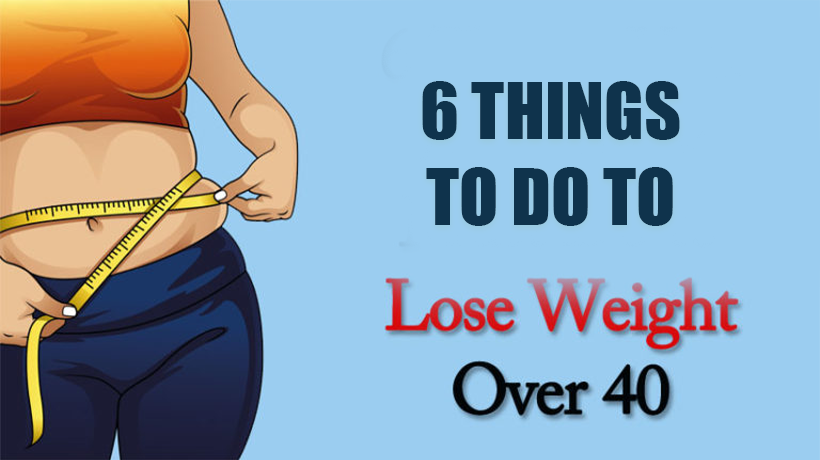Losing weight after 40 years old can be quite a hassle. Everything slows down, and you wonder if it’s possible as you step on the scale and see your weight hasn’t budged. Here are six things you must do if you’re over 40 and you want to lose weight.
Be mindful of calories
Keeping track of your daily caloric intake is integral for losing weight and keeping it off when you’re older. According to a study published in the Journal of Behavioral Medicine, “Food craving is believed to be an important factor in calorie overconsumption, with overconsumption leading to weight gain.” Keep track of what you eat with a daily calendar and write how many calories you’ve eaten each day.
Exercise
Working out is essential for losing weight, no matter your age, but it’s even more important the older you get. According to a study published in the journal Progress in Cardiovascular Diseases, “Adults who exercised greater than 200 minutes per week (−13.1 kg) lost more weight compared to those who exercised between 150-199 min per week (−8.5 kg), and those that exercised less than 150 minutes week (−3.5 kg).” Make a workout goal for yourself to follow and walk or go to the gym.
Limit carb and fat intake
Your metabolism gets slower as you age, which makes it hard to shed those stubborn pounds. If your diet is high carb or high fat, you won’t lose much weight. According to a study published in the Journal of the Academy of Nutrition and Dietetics, People consuming more energy-dense foods and less whole grains are more likely to have higher BMI than those doing otherwise.” Avoid processed snacks and meals and eat healthier alternatives like fruits, vegetables, and proteins.
Eat more protein
Protein not only makes you feel fuller, it also helps you lose weight. According to Healthline, “Protein reduces levels of the hunger hormone ghrelin, while it boosts the appetite-reducing hormones GLP-1, peptide YY and cholecystokinin.” This makes you less inclined to reach for chips or sugary snacks throughout the day and it will help you lower your calorie intake.
Drink more water
According to a study published in the journal Obesity, “Absolute and relative increases in drinking water were associated with decreases in body weight, waist circumference, and percent body fat in overweight women assigned to four popular weight loss diets.” Drink at least eight cups of water a day to optimize your body and keep the weight off.
De-stress
Stress boosts cortisol production in your body and makes you crave sweets and carbs. According to another study published in Obesity, “Those with both high perceived stress and a number of stressful life events were at the highest risk of weight gain with the level of perceived stress significantly moderating the relationship between stressful life events and weight gain.” You can meditate, go for a leisurely walk, take a yoga class, or do something creative to keep stress at bay.
Sources:
Buscemi, J., Rybak, T. M., Berlin, K. S., Murphy, J. G., & Raynor, H. A. (2017). Impact of food craving and calorie intake on body mass index (BMI) changes during an 18-month behavioral weight loss trial. Journal of behavioral medicine, 40(4), 565-573.
https://www.ncbi.nlm.nih.gov/pmc/articles/PMC5501996/#R16\
Swift, D. L., Johannsen, N. M., Lavie, C. J., Earnest, C. P., & Church, T. S. (2013). The role of exercise and physical activity in weight loss and maintenance. Progress in cardiovascular diseases, 56(4), 441-7. https://www.ncbi.nlm.nih.gov/pmc/articles/PMC3925973/
Merchant, A. T., Vatanparast, H., Barlas, S., Dehghan, M., Shah, S. M., De Koning, L., & Steck, S. E. (2009). Carbohydrate intake and overweight and obesity among healthy adults. Journal of the American Dietetic Association, 109(7), 1165-72. https://www.ncbi.nlm.nih.gov/pmc/articles/PMC3093919/
https://www.healthline.com/nutrition/how-protein-can-help-you-lose-weight#section1
Stookey, J. D., Constant, F., Popkin, B. M., & Gardner, C. D. (2008). Drinking Water Is Associated with Weight Loss in Overweight Dieting Women Independent of Diet and Activity. Obesity, 16(11), 2481-2488. doi:10.1038/oby.2008.409
Harding, J. L., Backholer, K., Williams, E. D., Peeters, A., Cameron, A. J., Hare, M. J., . . . Magliano, D. J. (2013). Psychosocial stress is positively associated with body mass index gain over 5 years: Evidence from the longitudinal AusDiab study. Obesity, 22(1), 277-286. doi:10.1002/oby.20423



